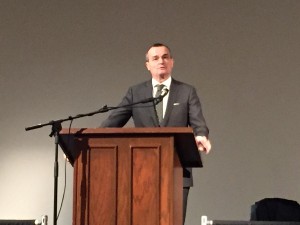
French Ambassador Gérard Araud addressed BYU students on French foreign policy on Thursday, Dec. 3, 2015. He focused his remarks on the recent attacks in Paris and the ongoing COP21 climate conference.
Araud said he was grateful for the thousands of messages of support the French Embassy has received since the Nov. 13 terrorist attacks.
“We have been moved by the outpouring of expressions of solidarity and friendship and support coming from our American friends and President Obama,” Araud said.
The ambassador explained the foreign policy that France has developed since the attacks. The nation sent warplanes to bomb the ISIS stronghold of Raqqa two days after the Paris attacks, but Araud said that was a quick government response to an immediate problem.
“The first thing any government should do is show that it is doing something,” Araud said. “The ‘do something’ was to increase our strikes on ISIS, but we do know that it won’t solve the problem. You don’t win a war with air strikes.”
Araud also said the French government is looking closely at the radicalization of young Muslims within its own borders. The government is working with Muslim leaders to bring radical youth into mainstream forms of worship, he said.
“France is a front line,” Araud said. “At any moment, the risk is still there. This is not only a problem in Europe in terms of security, but it’s also a problem in political terms. It’s breeding a political crisis.”
He said terrorist attacks and the migrant crisis are causing a surge in the far right in both American and European politics, but working together may improve the situation.
The ambassador also discussed COP21, a climate change conference hosted in Paris and attended by more than 190 countries. He said the attendees hope to make agreements that will reduce greenhouse gas emissions and hold the global temperature increase to two degrees Celsius.
Araud said negotiating might be tough because all countries attending the conference want to protect their own interests.
“A lot of Third World countries are telling us in the West, ‘You are trying to prevent us from doing what you have done in the last 50 years.’ They consider that they have a right to economic growth, so why should they be less polluting than we have been in the last 50 years?” he said. “There are a lot of different interests.”
But he did say that no country at COP21 wants to block negotiation.
“There is now a worldwide acceptance that the situation is serious, that the climate change is there,” Araud said. “It could have dramatic consequences on our future.”
Araud said he felt optimistic about the conference’s outcomes and the world’s future. He asked students to do their part by speaking to their local leaders and government officials.
“In this battle, you are our main support,” he said. “We need you. It’s not so much my future, but it’s your future and your life at stake.”
The Kennedy Center organized and recorded the French ambassador’s lecture. The recording will be available to view on kennedy.byu.edu.




